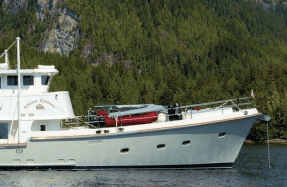
An onboard fire can start in all kinds of ways, from a dish towel falling on a hot stove while you’re cooking, or from the back of a corroded shore power inlet while you’re asleep. Safety and alarm systems can warn you that there’s a fire, and hopefully put it out—but the more time you spend on prevention, the less likely it is that you’ll actually have to fight a fire.
Here’s a look at smart prevention tips, as well as how to be prepared in case a fire gains the upper hand on your boat.
THE BASICS
A major factor in prevention is how well the operational systems are installed on a boat, and how well they are maintained. Prevention also includes general housekeeping: Moving combustible items away from open flames or hot equipment is low-hanging fruit. So is keeping a boat tidy. Extremely cluttered boats tend to have less access to equipment for routine checks; loose gear tends to shift into areas it shouldn’t. If access is needed quickly, gear needs to be shifted first, giving flames time to spread.
Also key is making






